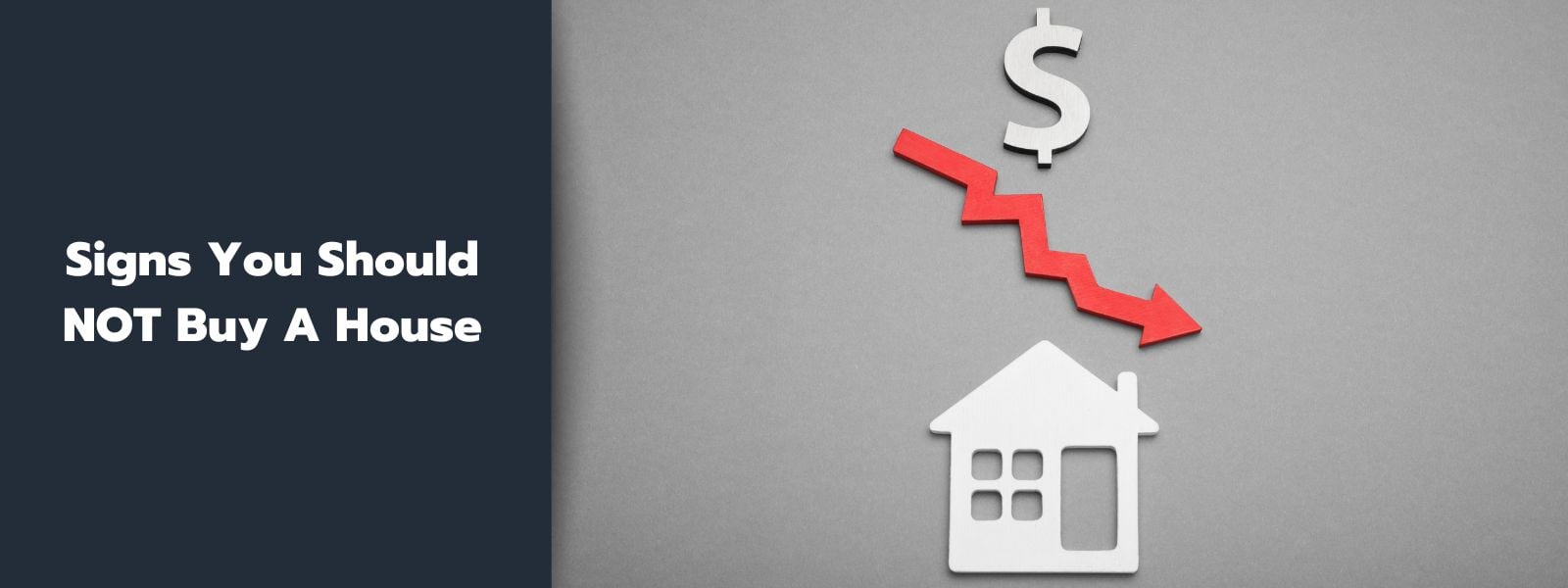Buying a house is a big financial decision that can have a significant impact on your life.
It not only changes your financial situation but also brings about a major shift in your lifestyle.
In fact, owning a home is comparable to completing your education or becoming a parent when it comes to how it affects your day-to-day life.
If you’re unsure about whether you’re prepared to purchase a house, we’ve put together a guide to help you make that decision.
Some aspects might involve straightforward calculations, while others may require deep introspection.
By going through this list, you’ll gain a clearer understanding of whether you are truly ready to take the plunge and buy a house.

Should I Buy A House? 7 Signs You’re Ready
Purchasing a home is a significant financial decision. To ensure you’re ready to buy a house, we’ll explore the top signs you may be prepared to buy a home.
1. Debt is Under Control
When assessing your mortgage application, lenders take your debt-to-income ratio (DTI) into account. This important measure compares your monthly debts to your monthly income. Your DTI is a measure of the likelihood that you’ll be able to afford a loan, given your current financial obligations and monthly income.
A high DTI means you’re more risky to lenders. On the other hand, a lower DTI means you’re less risky to lenders. A lower DTI provides more flexibility in your budget, allowing you to save money for home improvements, repairs, and unexpected expenses.
Typically, lenders are looking to see a DTI ratio that is less than or equal to 45%. If your debt-to-income ratio is above that, you should reevaluate your plans. Focus on getting a handle on your debt before considering a home purchase.
To find your current DTI: Add up all of your recurring monthly debts, including credit card debt, car payments, student loans, etc. Then, divide that number by your total monthly income and multiply it by 100 to get your percentage.
(Total Monthly Payments ÷ Monthly income) x 100 = DTI
Tips to Lower Your DTI
- Maintain low credit card balances
- Keep balances at or below 30 percent of the available credit limit (If your credit utilization ratio exceeds this threshold, improve it before applying for a mortgage)
- Pay off your bills
- Keep long-standing credit cards open (even after they have been fully paid)
2. Good Credit Score
As part of the loan approval process, lenders check your credit score. The specific score required for approval depends on the type of loan you are considering. As a general guideline, obtaining approval for a conventional loan typically necessitates a credit score of at least 620. However, it is feasible to obtain approval for an FHA loan, a program commonly utilized by first-time homebuyers, with a score as low as 500.
Although it is possible for borrowers with a credit score as low as 500 to qualify for certain home loans, they will be required to make larger down payments and pay higher interest rates. Having a higher credit score will provide you with better interest rates and loan terms.
We suggest working on enhancing your credit score as much as possible before embarking on your house-hunting journey. Simply put, individuals with exceptional credit scores are offered the most favorable interest rates. Conversely, if your score is lower, you will likely find yourself paying a higher amount for your home over time.
To determine your credit score, obtain a free copy of your credit report and carefully examine it. Take note of the factors that are negatively impacting your score and focus on improving those areas, as well as paying down your overall debt.
3. You Have Money for a Down Payment
First-time homebuyers often face a major hurdle when it comes to homeownership: the down payment. Without proceeds from a previous home sale to use, funding the down payment becomes a challenge.
The down payment requirement is a percentage of the total home price, which varies depending on the type of loan. Generally, conventional loans demand a 20% down payment to avoid the need for private mortgage insurance (PMI). While there are mortgages that require less upfront payment, it’s important to consider that a smaller initial payment means borrowing a larger amount, resulting in increased interest payments over time.
If we take a $300,000 home, a 20% down payment would amount to $60,000. Such a figure can be daunting, but there are various grants and programs available to help homebuyers find extra money for a down payment.
There are a number of programs offering down payment assistance for homebuyers throughout the country. The programs are provided by federal, state, county, or local government agencies, nonprofits, and employers.
Homebuyers should also expect to cover closing costs, which normally range from 2% to 5% of the home’s selling price. The good news is that many of these costs are negotiable. Since buyers put a significant portion of their resources into the down payment, efforts are typically made to have the seller contribute to or cover some, if not all, of the closing costs.
4. Steady & Reliable Source of Income
A steady income is essential for making monthly mortgage payments. Lenders also take into account your regular income when deciding how much they may be willing to lend you.
Before approving your home loan, lenders require confirmation that you have a steady income to afford the mortgage expenses and will continue to do so in the foreseeable future. For lenders, this confirmation mainly relies on having a stable employment history.
To validate your employment history, lenders usually request your W-2 forms for the past two years. In case you’re self-employed, you should be prepared to provide your tax returns for the same time period. Additionally, you’ll need to show any 1099 forms you have received during that timeframe as well.
While there isn’t a specific minimum income required to purchase a house, there are methods to estimate if you have enough cash flow to qualify for a loan. One approach is to calculate your debt-to-income ratio (DTI), which lenders use to assess whether borrowers can reasonably handle additional debt.
Even though there is no predetermined income amount needed for a mortgage, you should have enough income to meet the DTI requirements specific to your loan. Typically, most borrowers can obtain approval with a DTI below 50%.
5. Considered the Costs of Homeownership
The true cost of owning a home goes beyond just the monthly payment. Some other expenses associated with homeownership include:
- Insurance: While it’s not a legal requirement like car insurance, mortgage lenders ask for sufficient insurance coverage as a condition for the loan.
- Property Taxes: Regardless of your location, you must pay property taxes. These taxes fund local services such as fire departments, public schools, and libraries. They are calculated as a percentage of your home’s value, meaning the higher your home’s worth, the more you’ll pay.
- Closing Costs: These are one-time expenses paid when finalizing the loan. Closing costs encompass items like title insurance, attorney fees, lender charges, and more. Typically, they range from 3% to 6% of the total loan amount.
- Utilities: While living in an apartment or rental home, your landlord may cover some utility costs. However, as a homeowner, it becomes your responsibility to handle water, electricity, trash collection, and sewage bills each month.
- Maintenance: Owning a home also means being prepared to cover regular maintenance expenses, as well as unexpected repair costs. Particularly in older homes, repair expenses can significantly impact your monthly budget.
To ensure you’re ready to buy a home, it’s important to consider all these costs, not just the monthly payment.
6. It’s a Buyer’s Market
In addition to assessing your financial situation, you should also consider the current market conditions before deciding on the best time to make your purchase. Specifically, you should evaluate the prevailing interest rates. When mortgage rates are low or showing a downward trend, you will end up paying less in total when you borrow money.
Moreover, it’s important to take into account whether the real estate market in your area favors buyers or sellers at the moment. Qualified real estate agents can assist you in making this determination, but ideally, you would want it to be a buyer’s market. During a buyer’s market, there tends to be a greater selection of properties available for potential buyers, which makes sellers more open to negotiating on price.
When the prices are obviously favorable, it’s a good indication that it might be the right time to buy. In a buyer’s market, the low prices increase the chances of your house appreciating in value over time. For instance, considering the impact of the COVID-19 pandemic on the economy, we might witness a decrease in home prices if history repeats itself.
7. It Suits Your Lifestyle Needs
Buying a house is a significant undertaking that requires careful consideration, as most mortgages demand a commitment of 15 to 30 years. While it’s not mandatory for you to reside in your home for the entire duration, it’s crucial to be certain that you are prepared for the potential long-term financial responsibility.
Not quite sure about the direction of your career? Considering a potential relocation to a different city? Is your income somewhat inconsistent?
In these circumstances, you may not be in a position to purchase a home just yet. However, if you anticipate settling down, starting a family, or remaining in one place for a few years, then buying a home could prove to be a wise decision. It provides stability and the opportunity to establish roots in a community.

Signs You Should NOT Buy a House
It is crucial to understand the right moment for purchasing a house and when it might be better to wait. If any of the following conditions apply to you, it would be advisable to stay with your present living situation for the time being.
You Have a Lot of Debt
You don’t have to be completely free from debt in order to purchase a home, but having excessive debt can potentially hinder your chances of getting approved for a loan. Moreover, if you accumulate too much debt, it can also lead to higher expenses associated with your mortgage, as it becomes less likely for you to secure the most favorable interest rates.
It is advisable to develop a well-defined strategy to gradually reduce your debt prior to committing to a monthly mortgage payment. This approach will help you navigate the various costs and responsibilities that come with homeownership more effectively.
Don’t Have a Stable Income
Career stability is important for maintaining a consistent income and having a clear idea of your financial situation. When you have been in the same job for at least 2 years and don’t plan on leaving in the near future, it allows you to predict and rely on a steady flow of money coming in each month. This predictability is particularly valuable when considering how much home you can afford.
By having a stable income, you gain a better understanding of your financial capacity. However, if you have recently started a new job or are contemplating a career change in the near future, it may be wise to hold off on purchasing a home until you are more prepared.
You Don’t Have Any Savings
Owning a home comes with the responsibility of taking care of any repairs that arise. It’s crucial to have a contingency plan in place, such as an emergency fund, to avoid falling into debt when unforeseen issues occur.
To ensure financial stability, it’s advisable to save an emergency fund that can cover living expenses for at least three months before even considering the possibility of obtaining a mortgage. Planning ahead and being prepared will go a long way in safeguarding your financial well-being in the face of unexpected expenses.

Wrapping Up Our Guide to the Cost of Living in Texas
Are you prepared to purchase a house?
Put simply, yes, if you have the financial means to do so.
However, determining affordability is not solely based on your current bank account balance.
Several other financial and lifestyle factors need to be taken into account when making this decision.
When you consider all these factors, the question of whether you can truly afford to buy a house becomes more complex than it initially seems.
However, evaluating the financial aspects before making the purchase can help you avoid expensive mistakes and financial difficulties down the line.
If you still aren’t sure whether you’re ready or not and would like to discuss your options, Helen Painter Group Realtors is here to offer our expertise.
The longest-standing and most trusted real estate agency in Fort Worth, TX, we’ve been serving buyers and sellers since 1958.
With over six decades of success behind us, you’ll enjoy peace of mind knowing your best interests are represented throughout the process.
To learn more or speak with an agent, feel free to give us a call at (817) 923-7321 or contact us.

